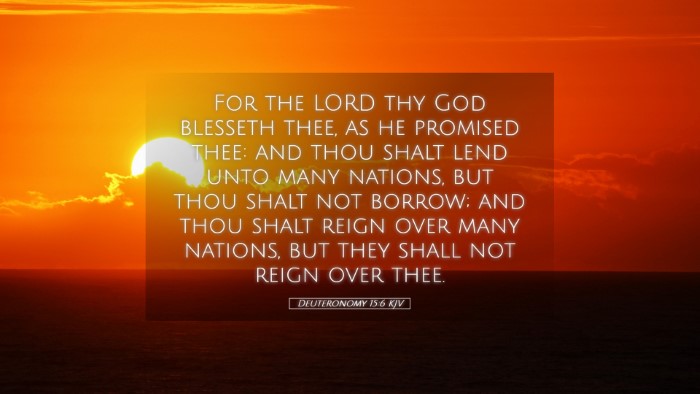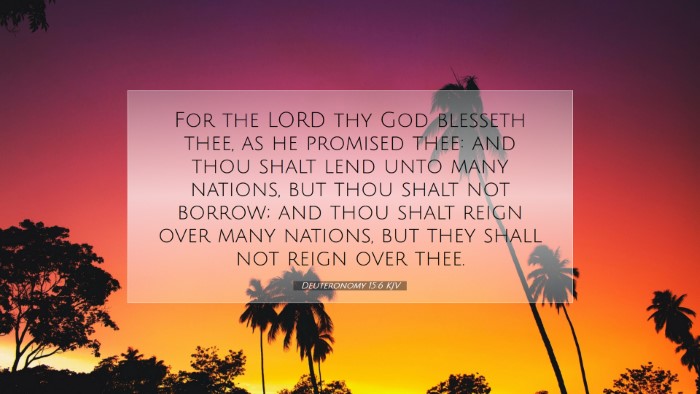Commentary on Deuteronomy 15:6
Deuteronomy 15:6 states: "For the Lord your God will bless you, as he promised you; and you shall lend to many nations, but you shall not borrow; and you shall reign over many nations, but they shall not reign over you." This verse encapsulates profound themes of divine blessing, economic principles, and the sociopolitical stature of Israel among the nations. The insights from several public domain commentaries enable a deeper understanding of these themes.
Contextual Overview
This verse is set within a larger discourse concerning the sabbatical year, highlighting God’s provisions and the liberation of debts. This context reveals how Israel's economic practices should reflect their identity as a people chosen by God. There is an emphasis on ethical dealings and the blessings that flow from obedience to God's commands.
Theological Implications
- Divine Blessing: God's promise to bless His people is reiterated in this verse. Matthew Henry notes that this divine blessing is not arbitrary but is tied to Israel's faithfulness and God’s covenant. As they obey His commands, they experience His favor and abundance.
- Economic Autonomy: The verse conveys a vision of economic independence. Albert Barnes points out that Israel is meant to lend without borrowing, a sign of strength and stability. This reflects a divine order where nations look to Israel for support instead of the reverse.
- Sociopolitical Power: Adam Clarke elaborates on the notion of reigning over nations. The Israelites' adherence to God’s laws positions them as leaders rather than subjugated peoples. There is a prophetic undertone suggesting that Israel's obedience will elevate them among the nations.
Commentary Insights
Matthew Henry emphasizes the significance of the statement, indicating that it is not merely a promise but a declaration of a lifestyle that God desires for His people. The command to lend reflects generosity and a commitment to help others, establishing Israel as a beacon of hope and foresight.
Albert Barnes provides additional insight into the societal structure envisioned by God. He highlights that this is not only a promise but a commitment to establish a socio-economic system where God's people thrive. Those who lend are expected to trust in God’s provision, further magnifying their faith in the unfolding of God's plans.
Adam Clarke comments on the condition of being ruled by none. He suggests that through obedience to God's commands, Israel would experience a position of honor and authority, with nations looking to them rather than governing over them. This highlights the hope and strength derived from a faithful relationship with God.
Practical Applications
- Faithfulness and Obedience: The call to lend freely but not borrow urges pastors and leaders to consider how they adhere to God's word in their leadership and economic practices within their communities.
- Empowerment through Generosity: The emphasis on lending rather than borrowing serves as a model for personal and communal empowerment through generosity, promoting a cycle of blessing rather than dependence.
- Leadership as a Reflection of Divine Favor: It is a reminder for today's leaders that true authority is derived from obedience to God, suggesting that their influence should come as a result of their faith and actions in accordance with divine principles.
Conclusion
Deuteronomy 15:6 encapsulates important economic and theological principles for both ancient Israel and contemporary faith communities. The insights drawn from prominent commentaries highlight the blessings of obedience, the strength of autonomy, and the divine calling for leadership. As pastors, students, and theologians reflect on this scripture, they are encouraged to embrace a life marked by trust in God's provision, engage in generosity, and seek leadership that aligns with divine will.


